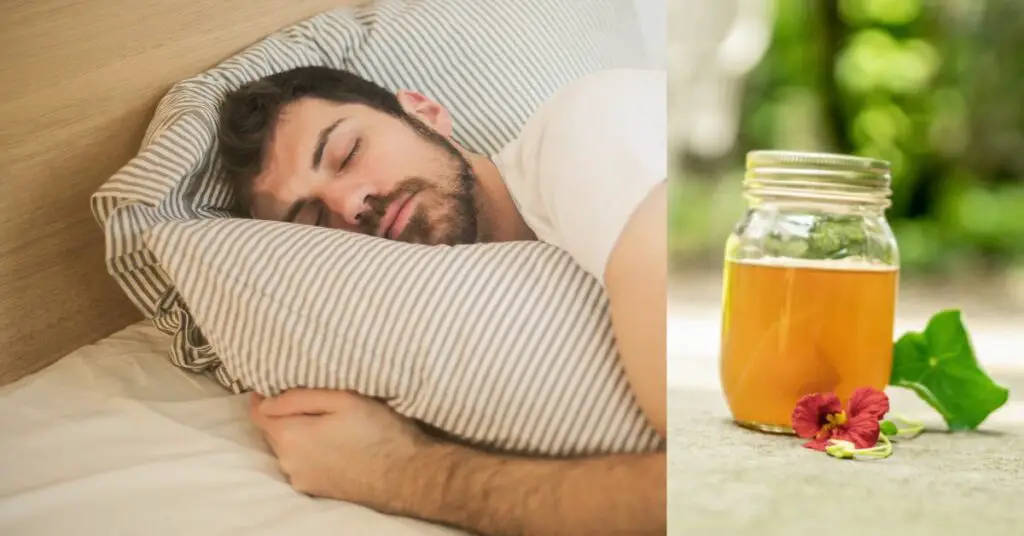Kombucha is a fermented tea that has been enjoyed for centuries. The fermentation process creates beneficial probiotics, organic acids, and enzymes that promote gut health.
The probiotics in kombucha can also help to balance the skin’s natural microbiome and fight off bad bacteria.
With all these benefits, people wonder whether it’s good to consume kombucha before going to bed. The truth is, If you are sensitive to caffeine, it’s best to avoid consuming kombucha a few hours away the bedtime as it could actually lead to sleep disruptions.
In this article, we will explore the topic of kombucha and sleep in more detail and answer some common questions.
What is Kombucha?
Kombucha is a fermented tea that has been around for centuries.
It is said to have originated in China, and it has been used in traditional Chinese medicine for centuries. Kombucha is made by fermenting sweetened tea with a culture of bacteria and yeast. The resulting
Kombucha has become increasingly popular in recent years as more people are interested in probiotic-rich foods that can promote gut health. Some studies have shown that kombucha may help improve digestion and boost the immune system.
While more research is needed to confirm these potential health benefits, there is no doubt that kombucha is a delicious and healthy beverage that is rich in probiotics, vitamins, and minerals worth trying!
The Bad Impact of Kombucha on Your Sleep
Kombucha is a type of fermented tea that has been around for centuries. It’s made by adding a symbiotic colony of bacteria and yeast (SCOBY) to sweetened tea. This SCOBY ferments the sugar in the tea, which turns it into kombucha.
While kombucha has many health benefits, it can also have a negative impact on your sleep.
The fermentation process that creates kombucha produces caffeine (10 to 25 mg of caffeine per cup), and while kombucha generally has less caffeine than coffee, it can still keep you up at night. In addition, the acidity of kombucha can cause heartburn and indigestion, which can make it difficult to fall asleep.
If you’re having trouble sleeping, it’s best to avoid kombucha and other caffeinated beverages in the evening. If you do drink kombucha, be sure to drink it earlier in the day so that it doesn’t keep you up at night.
What Beverages Make Your Sleep Better?
If you’re struggling to get a good night’s sleep, you might want to consider what you’re drinking before bed. There are a few beverages that can help you sleep better, and we’ve got the scoop on which ones to choose.
First up is chamomile tea. This herbal tea has long been used as a natural sleep aid, and for good reason. Chamomile tea is caffeine-free and contains compounds that can help to relax the body and mind.
If you’re not a fan of tea, try warm milk. Milk contains the sleep-inducing amino acid tryptophan, which can help you drift off to sleep.
Finally, if you’re looking for a non-alcoholic option, try cherry juice. Cherry juice is rich in melatonin, a hormone that helps to regulate the body’s sleep-wake cycle.
So, next time you’re having trouble sleeping, reach for one of these beverages and see if it helps you get a better night’s rest.
The Right Time to Take Your Kombucha Intake
Most people assume that the best time to drink kombucha is first thing in the morning, on an empty stomach. However, this may not be the best choice for everyone.
Some experts believe that it’s best to drink kombucha later in the day, after a meal. This is because the probiotic bacteria in kombucha can help to break down and digest food. Drinking kombucha before a meal may also help to increase appetite.
Ultimately, the best time to drink kombucha is whenever you feel like it but avoid drinking before bed or in the evening time.
The Health Benefits of Kombucha
Kombucha is a fermented tea that has been consumed for centuries in Asia.
The health benefits of drinking kombucha are many and varied and include improved digestion, increased energy levels, reduced inflammation, and a strengthened immune system.
Kombucha is rich in probiotics, which are beneficial bacteria that help to keep the gut healthy. These probiotics can help to improve digestion and reduce inflammation. In addition, kombucha is a good source of antioxidants, which can help to protect the body against damage from free radicals.
There is some evidence to suggest that kombucha may also boost energy levels. This may be due to the fact that kombucha contains iron, B vitamins, and other nutrients that are essential for energy production.
While more research is needed to confirm the health benefits of kombucha, there is no doubt that this delicious beverage can be a healthy addition to your diet. So why not give it a try? Your gut (and taste buds) will thank you!
Frequently Asked Questions Related to Kombucha And Good Sleep
1. Is kombucha good before bed?
Kombucha is a fermented drink made from black tea, sugar, and bacteria.
Some people believe that kombucha has lots of health benefits, such as aiding in weight loss, detoxing the body, and improving gut health. But there’s not much scientific evidence to support these claims.
What we do know is that kombucha contains high levels of caffeine and alcohol. So it’s best to avoid drinking kombucha hours before bed if you’re looking for a good night’s sleep. Drink it earlier in the day instead!
2. Does kombucha affect sleep?
Drinking kombucha before bed can lead to sleep disruptions. Kombucha is a fermented drink that contains probiotics, which are healthy bacteria your gut needs for optimal function.
However, consuming probiotics close to bedtime can lead to disruptions in sleep, as the probiotics may activate your digestive system and keep you up at night. If you want to enjoy kombucha before bed, try spacing it out at least two hours before hitting the sheets.
3. What time of day is it best to drink kombucha?
Kombucha is great any time of day, but many people like to drink it in the morning to jumpstart their day. It’s also a good option if you need a pick-me-up in the afternoon. Some people choose to drink kombucha in the evening, but I think it’s best to drink it when you need it without any specific timing restrictions.











